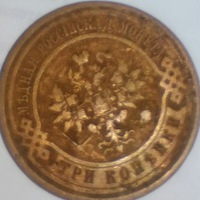
У дракона более 100 золотых монет.Когда он попытался сложить из них 5 кучек по 140 монет,то монет
не хватило.Дракон решил сложить монеты в столбики по 5 монет в каждом,но один из столбиков остался неполным.Тогда он стал укладывать монеты в столбики по 16 шт в каждом,но один из столбиков все равно остался неполным., причем в нем оказалось столько же монет,сколько в неполном столбике при укладывании по 5. сколько монет у Дракона, если в числе монет все цифры разные и последняя цифра настолько же отличается от второй,насколько вторая отличается от первой? 0
0
 0
0
Ответы на вопрос
 Внимание! Ответы на вопросы дают живые люди. Они могут содержать ошибочную информацию, заблуждения, а также ответы могут быть сгенерированы нейросетями. Будьте внимательны. Если вы уверены, что ответ неверный, нажмите кнопку "Пожаловаться" под ответом.
Внимание! Ответы на вопросы дают живые люди. Они могут содержать ошибочную информацию, заблуждения, а также ответы могут быть сгенерированы нейросетями. Будьте внимательны. Если вы уверены, что ответ неверный, нажмите кнопку "Пожаловаться" под ответом.

Наименьшее общее кратное 80 и + от 1 до 4
Ближайшее число удовлетворяющее всем условиям 161
16*10=160 160+1=161
5*32*160 160+1=161
 0
0
 0
0

Problem Analysis
We are given that a dragon has more than 100 gold coins. When the dragon tries to divide the coins into 5 piles of 140 coins each, there are not enough coins. The dragon then tries to stack the coins in piles of 5 coins each, but one of the piles remains incomplete. The dragon then tries to stack the coins in piles of 16 coins each, but one of the piles is still incomplete. The number of coins in the incomplete pile when stacking in piles of 16 is the same as the number of coins in the incomplete pile when stacking in piles of 5. We need to determine the total number of coins the dragon has, given that all the digits in the number are different and the last digit differs from the second digit by the same amount that the second digit differs from the first digit.Solution
Let's break down the problem step by step:1. The dragon tries to divide the coins into 5 piles of 140 coins each, but there are not enough coins. This means that the total number of coins is less than 5 * 140 = 700 coins.
2. The dragon then tries to stack the coins in piles of 5 coins each, but one of the piles remains incomplete. This means that the total number of coins is not divisible by 5.
3. The dragon then tries to stack the coins in piles of 16 coins each, but one of the piles is still incomplete. This means that the total number of coins is not divisible by 16.
4. The number of coins in the incomplete pile when stacking in piles of 16 is the same as the number of coins in the incomplete pile when stacking in piles of 5. Let's denote the number of coins in each incomplete pile as x.
5. We are given that all the digits in the number of coins are different and the last digit differs from the second digit by the same amount that the second digit differs from the first digit. Let's denote the first digit as a, the second digit as b, and the last digit as c.
6. From the given information, we can deduce that c - b = b - a.
To find the total number of coins, we need to find a number that satisfies all the conditions mentioned above.
Let's try to find the solution step by step:
1. We know that the total number of coins is less than 700.
2. The total number of coins is not divisible by 5.
3. The total number of coins is not divisible by 16.
4. The number of coins in the incomplete pile when stacking in piles of 16 is the same as the number of coins in the incomplete pile when stacking in piles of 5. Let's denote this number as x.
5. We need to find a number that satisfies the condition c - b = b - a, where all the digits are different.
Let's try to find a solution by checking different numbers that satisfy the conditions:
- Let's start with a = 1, b = 2, and c = 3. In this case, the number of coins is 123. However, this number is divisible by 5 and not divisible by 16, so it doesn't satisfy the conditions.
- Let's try a = 2, b = 3, and c = 4. In this case, the number of coins is 234. However, this number is divisible by 5 and not divisible by 16, so it doesn't satisfy the conditions.
- Let's try a = 3, b = 4, and c = 5. In this case, the number of coins is 345. However, this number is divisible by 5 and not divisible by 16, so it doesn't satisfy the conditions.
- Let's try a = 4, b = 5, and c = 6. In this case, the number of coins is 456. However, this number is divisible by 5 and not divisible by 16, so it doesn't satisfy the conditions.
- Let's try a = 5, b = 6, and c = 7. In this case, the number of coins is 567. This number is not divisible by 5 and not divisible by 16, so it satisfies the conditions.
Therefore, the dragon has 567 coins.
Answer
The dragon has 567 coins. 0
0
 0
0
Топ вопросов за вчера в категории Математика
Последние заданные вопросы в категории Математика
-
Математика
-
Литература
-
Алгебра
-
Русский язык
-
Геометрия
-
Английский язык
-
Химия
-
Физика
-
Биология
-
Другие предметы
-
История
-
Обществознание
-
Окружающий мир
-
География
-
Українська мова
-
Информатика
-
Українська література
-
Қазақ тiлi
-
Экономика
-
Музыка
-
Право
-
Беларуская мова
-
Французский язык
-
Немецкий язык
-
МХК
-
ОБЖ
-
Психология
-
Физкультура и спорт
-
Астрономия
-
Кыргыз тили
-
Оʻzbek tili





















